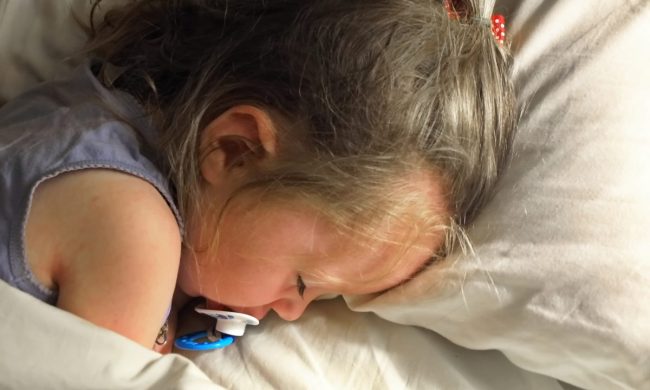We’ve all heard the expression about there not being a point in crying over spilled milk, but as parents, we know kids do. Children cry over a lot more than a spilled drink, especially when youngsters are toddlers and don’t have the words to express what they’re feeling. Many parents, however, deal with a crying child multiple times a day.
If your little one tends to get upset over relatively minor things, you’re not alone. Lots of kids get upset when things don’t go the way they want, but for some, it seems like the tears flow freely and quite often. Perhaps it’s not that a crying child is being overly dramatic. It just might be that your child is highly sensitive.
Is your crying child highly sensitive?

When children seemingly cry over every small thing, parents may wonder if there is an underlying cause. Of course, all kids have difficulty managing emotions, but for some, the struggle is constant. Dr. Elaine Aron developed the term highly sensitive child. According to Aron, heightened sensitivity in kids is more common than you think. It impacts around 15% to 20% of kids.
Highly sensitive is defined as a child who is extremely reactive to their surroundings. A highly sensitive child is typically acutely aware of the sights, sounds, and smells around them. Highly sensitive children are impacted by the emotions of people around them, too. So, how can you tell if your crying child is highly sensitive?
Irritable vs. highly sensitive
A poor night’s sleep, stress in the house, an illness, being hungry, and a change in routine are all reasons why children cry easily and are irritable. Even adults are quick to react when they’ve been up all night or are dealing with major issues. While most kids go through crying periods, there is a difference between being easily agitated at times and being highly sensitive. Aron developed a checklist for identifying if a child is highly sensitive. Some checklist items include if a child:
- Gets startled easily
- Hates surprises
- Doesn’t react well to change
- Doesn’t like being wet or dirty
- Enjoys quiet places
- Doesn’t like noisy environments
- Has difficulty sleeping after a super fun day
- Has a low threshold of pain
- Has a heightened sense of touch
Aron also noticed that highly sensitive kids are also clever, observant, intuitive, and thoughtful.
Highly sensitive or introverted
Many times, a highly sensitive child is misdiagnosed as introverted or shy. Since highly sensitive children tend to be on the quiet side, they’re often given the shy or introverted label. The difference is the sensory component is not a characteristic of being an introvert or shy. High sensitivity in kids can also be misdiagnosed as autism, attention-deficit-hyperactivity disorder, as well as a sensory processing disorder.
Is being highly sensitive a disorder?
The main thing to keep in mind if your child is highly sensitive is that it’s not a disorder or a learning disability. Being highly sensitive is considered a trait and something children are born with.
Consult your pediatrician
Since all kids go through crying periods, it’s important to determine the cause behind the tears. If your child is crying at the loud noises, is it because they are highly sensitive, or is there an underlying ear infection? The best thing to do if you’re checking off a lot of boxes on Aron’s checklist is to talk to your doctor about whether your child is highly sensitive. Your pediatrician can rule out any physical causes and can help determine if your little one is highly sensitive.
Embracing your highly sensitive child

Learning how to manage emotions is important for all children. Doing so for a highly sensitive child can be a bit more trying, but it’s vital. The most important thing is to give highly sensitive kids the coping skills they need. Here are some tips to keep in mind when dealing with your highly sensitive child.
Avoid labels
Labeling a child is never productive. So, try not to call your child overly sensitive, needy, shy, or dramatic. Instead, concentrate on the positive. Remember that highly sensitive kids have a fun sense of humor, ask a lot of thought-provoking questions, and are understanding of the emotions of others. These are all wonderful qualities.
Don’t be reactive
If your child is the only one crying at a birthday party because of a lost turn or the wrong color gift bag, take a deep breath. Highly sensitive kids are good at reading other people’s emotions. So, if you’re tense, angry, or annoyed, it will only escalate your child’s reaction. Instead, take a moment to compose yourself.
Verbalize feelings
When kids are upset, they often lack the words to express their feelings. You can’t teach kids how to manage their feelings if they don’t know what they are. Reading books on emotions and talking about them will help kids understand their feelings. Then, they can recognize why they’re feeling frustrated, and you can talk about it and find a solution together.
Tools
Counting to 10 is a simple way to help kids take a step back. Encourage your child to count silently to 10 when they’re starting to feel upset. While highly sensitive kids don’t like change, it can be a good idea to put aside a difficult task or take a walk to remove themselves from an upsetting situation before the tears flow.
Another important tool is to be prepared. If your child is bothered by loud noises, don’t necessarily avoid the fireworks or the carnival. Instead, carry a pair of earplugs or earphones in your bag. Bring sunglasses to the dentist if the bright lights bother their eyes. While you can’t plan for everything, you can problem-solve ahead of time to help make an outing, vacation, dinner out, or party more enjoyable.
All parents have to deal with a crying child. If your child seems to cry more easily and at the slightest change, talk to your pediatrician, especially if this is something new. High sensitivity is a trait children are born with. While it does have challenges, it also has pluses. Unlike the terrible twos or threes, being highly sensitive isn’t a stage your child is going to outgrow. As children develop and mature, they will learn how to better manage being highly sensitive with your help.




